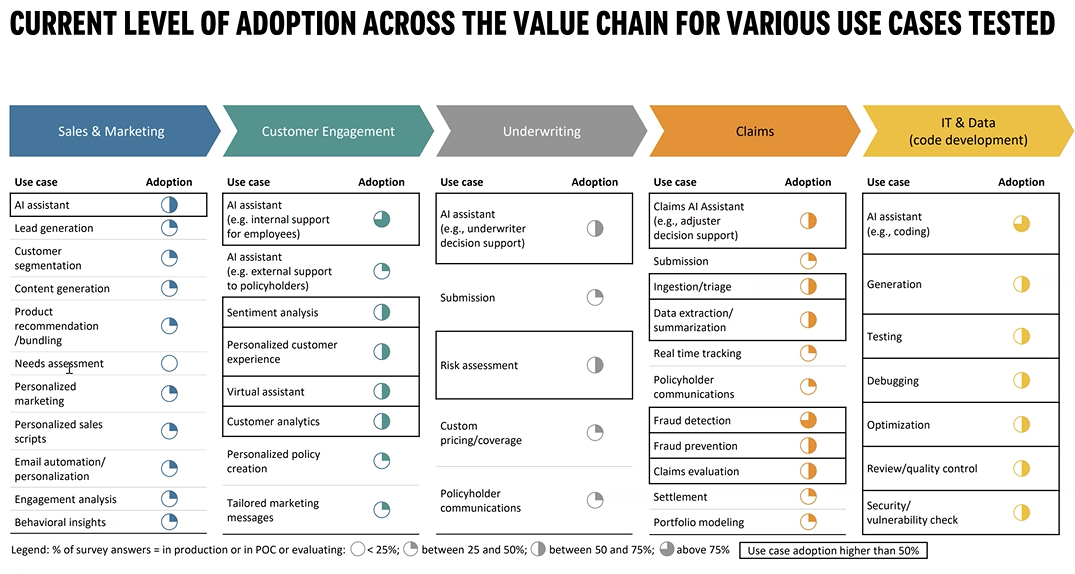
Transforming Insurance with Generative AI Chatbots
The insurance industry is on the cusp of a significant transformation, driven by the integration of Generative AI, which merges cognitive linguistics with data science. Natural Language Processing (NLP) and AI-powered chatbots are revolutionizing how insurance companies interact with their customers, reshaping traditional practices and paving the way for a more efficient and customer-centric approach.
Enhancing Customer Interactions
AI-powered chatbots serve as digital assistants that can handle a myriad of customer inquiries, process claims, and provide policy information in real-time. This shift towards automation not only enhances customer satisfaction but also significantly improves operational efficiency. By providing instant responses to common questions and concerns, chatbots alleviate the pressure on human customer service representatives, allowing them to focus on more complex issues that require a personal touch.
According to Gartner, by 2025, it is predicted that AI-powered chatbots will manage 75% of customer interactions within the insurance sector. This statistic underscores the growing reliance on technology to enhance service delivery and streamline operations. Companies such as Lemonade have successfully implemented AI-driven chatbots, achieving notable reductions in response times and operational costs. For instance, Lemonade’s chatbot, Maya, can handle everything from policy inquiries to claims processing, offering customers a seamless experience.
Streamlining Claims Processing with NLP and OCR
Beyond customer interactions, advancements in NLP and Optical Character Recognition (OCR) are significantly improving the analysis and processing of insurance claims. Traditional claims processing can be cumbersome and prone to errors, often requiring extensive manual input and verification. However, technologies like IBM Watson can read both organized and messy text data, extracting critical details needed for claims processing.
When a claim is submitted, Watson can analyze the documentation, identifying relevant information and categorizing it for further action. This data is then fed into a machine learning algorithm, which organizes the information into the correct sections of the claim form. This automated approach not only speeds up the claims process but also enhances accuracy, reducing the likelihood of errors that can lead to disputes or delays.

Innovative Applications in Other Fields
The implications of AI in data processing extend beyond insurance. For example, NVIDIA has developed tools like MegaMolBART, which can understand the language of chemistry and learn the relationships between atoms in real-world molecules. This capability is not only beneficial for the insurance industry but also has profound implications for drug discovery in biomedical research, enabling faster and more efficient development of new medications.
By leveraging advanced AI technologies, organizations can unlock insights and enhance their capabilities across various sectors, driving innovation and improving outcomes.
Leading Industry Players in NLP
Several industry leaders are pioneering advancements in NLP and AI technology within the insurance sector. Companies like Expert AI, Allstate, Sapiens, and IBM are at the forefront, developing innovative solutions that enhance customer engagement and operational efficiency. Their investments in AI technology are transforming traditional insurance practices, creating a more responsive and agile industry.
Challenges and Considerations
While the benefits of Generative AI chatbots are significant, the implementation of such technologies is not without challenges. Data privacy and security remain paramount concerns, especially when handling sensitive customer information. Insurance companies must ensure that their AI systems comply with regulations and maintain high standards of data protection.
Additionally, while chatbots can manage routine inquiries, human oversight is still crucial for complex cases that require empathy and nuanced understanding. Balancing automation with personalized service will be key to maintaining customer trust and satisfaction.
The Future of Insurance with AI
As we continue to explore the potential of Generative AI in the insurance industry, the future holds exciting possibilities for improved customer engagement and streamlined operations. By controlling the power of AI, insurance companies can not only enhance their service offerings but also foster a culture of innovation that drives the industry forward.
The integration of Generative AI and NLP technologies is not just a trend; it is a fundamental shift that will shape the future of insurance, creating a more efficient, responsive, and customer-centric industry.

Header photo by Christin Hume on Unsplash
Subscribe to Our Newsletter
Get the latest insights about Global solutions for leading insurers on your email




